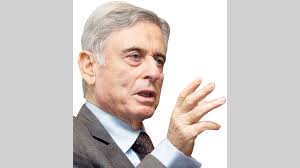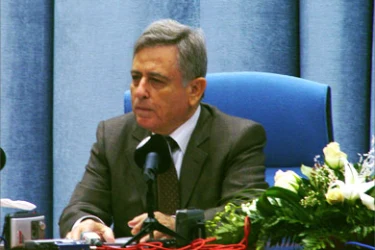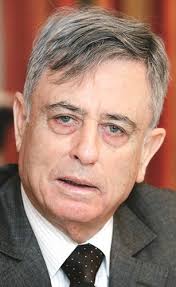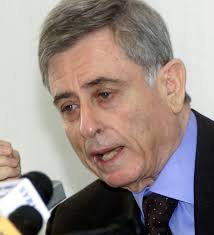Abdel Halim Khaddam, the former vice president of Syria, recently made his third visit to Brussels in the past few weeks. During these visits, he engaged in talks and consultations with various actors, although he prefers not to disclose details about them. Asharq Al-Awsat had the opportunity to meet with him on the sidelines of his visit and conducted the following interview:
Question: you mentioned a few days ago that there are ongoing consultations within Syria regarding the formation of a transitional governing council. How will this council function and become a reality while the Syrian regime remains militarily and security-wise intact?
Khaddam’s response: The consultations being held within Syria aim to establish a structure that supports the revolution and works towards achieving its objectives in two phases: the first being the overthrow of the regime, and the second involving the management of the country after its fall. Within a few months, the transitional period will lead to a constitutional status through the holding of free elections.
During this transitional period, the formation will be responsible for issuing decisions and laws, as well as implementing measures aimed at establishing political freedom in all areas. This includes the freedom to form political parties, ensuring media freedom, repealing exceptional laws that violate human rights, and preventing the exclusion of Syrians living abroad. Furthermore, it involves the annulment of all decisions issued by the State Security Courts and the Military and Civil Courts related to political reasons, the development of an election law draft, and the release of all prisoners of conscience.
These laws and decisions will serve as the foundation for conducting free elections and holding accountable all those who have committed crimes against the Syrian people, including those involved in illicit enrichment. Naturally, this will be supported by opposition parties abroad who are keen on supporting the revolution, as they will encourage leaders within Syria to establish this structure.
Question: What is your relationship with the Council, and do you believe that the international community will recognize it similarly to how they recognized the Transitional Council in Libya?
Khaddam’s response: As I mentioned earlier, the formation of this body is the responsibility of internal leaders. I certainly support this step because it represents a significant development in the events taking place in Syria and the region.
Question: Does the Council consist of military personnel, or will it primarily consist of civilian figures?
Khaddam’s response: I have specifically referred to the involvement of civilians in the Council and not military personnel. The military sector has its own distinct characteristics related to its nature, composition, and various parties involved.
Question: There is information suggesting that the Free Syrian Officers Brigade or Movement has initiated movements as a precursor to a potential military coup. Is such a scenario possible?
Khaddam’s response: The Free Officers Movement is a step taken by some military personnel as part of their national efforts to save the country. The process of change is influenced by various factors, and the military aspect is one dimension of it.
In short, multiple factors will contribute to bringing about change, but it is challenging to assess the possibility of a military coup. It is more likely that the armed forces will experience fragmentation due to the national and psychological consequences of the military situation. Many people are questioning the direction in which Bashar Al-Assad is leading them. This raises another question: What should be done? Consequently, as I mentioned before, the army is approaching this critical state due to national, psychological, and material reasons.
A state on the brink of bankruptcy will soon find it difficult to meet even the minimum requirements for military operations.
Question: Does the military have any connection to the Transitional Council, or does it represent a separate aspect of the Council?
Khaddam’s response: Currently, there is no discussion of a military aspect within the Council. However, all Syrians appreciate the capabilities of national military personnel who have not severed their ties with the country and who recognize the dangers of blindly following the regime’s instructions. It would be excellent if they could form a military structure that contributes to achieving change and achieving victory in the revolution.
Question: Regarding the Security Council resolution and Russia’s position, do you believe Russia will use its veto power, and if so, why?
Khaddam’s response: Russia is playing a role that will ultimately harm its future interests in Syria and the region. It is operating under the illusion that the regime will persist and continue to fulfill the role played by the Soviet Union in the past. However, due to the distinct nature of the current phase, this will not be the case. I believe that eventually, Russia will be unable to resist the mounting pressure from the international community and Arab public opinion. It will likely follow a similar course of action as it did in the case of Libya.
Question: Syrian-Turkish relations are facing an unprecedented crisis. Do you think Turkey could engage in a confrontation with the Syrian regime if the Syrian provocation near the border continues?
Khaddam’s response: The Turkish government has taken several significant positions that are highly appreciated by Syrians, while Arab governments remain silent. However, I believe that a clash between Turkey and the Syrian regime will only occur in two scenarios: if the regime attacks Syrian refugees on Turkish territory or if the international community decides to protect the Syrian people and enable them to achieve their aspirations. In such cases, considering Turkey’s regional and international position, I anticipate that Turkey will become a partner in implementing international resolutions.
Question: Will Iran remain passive if Turkey intervenes militarily in Syria? How do you interpret the statements made by Hezbollah officials regarding their response to potential military action against the Syrian regime?
Khaddam’s response: Iran is deeply concerned about the fate of the Syrian regime. The Iranian leadership understands that the fall of the regime would have dire consequences, as Syria is a key ally that has helped Iran dominate Lebanon. The regime’s downfall would result in a significant shift in the existing equation in Lebanon, leading to a decline in Hezbollah’s influence. Losing Syria would mean losing an essential strategic base on the Mediterranean coast and on the borders of Palestine. While Iran has provided support to Bashar Al-Assad, it will not engage in a full-fledged war on his behalf, as it recognizes the serious consequences of such involvement. Since the Iran-Iraq war, Iran has avoided direct military clashes and has instead relied on its supporters in the Arab and Islamic worlds to promote its interests. Hezbollah’s statement reflects their fear, as they understand that jeopardizing Syria’s security is not the same as jeopardizing the security of Beirut.
Question: The Syrian opposition, both inside and outside the country, has consistently rejected foreign intervention in Syria. How do you explain this stance, and who can protect civilians in the face of the regime?
Khaddam’s response: The regime has propagated the slogan of non-intervention as a means to protect itself, and unfortunately, many opponents have fallen into this trap. Foreign intervention driven by colonial motives is unacceptable under any circumstances. However, intervention by the international community in accordance with the United Nations Charter and the Universal Declaration of Human Rights is an entirely different matter. I can confirm that the vast majority of Syrians are seeking the intervention of the international community, as the continuation of the current situation will lead to a dangerous environment that pushes many towards extremism. This poses risks to Syria, as we must consider the amount of bloodshed and destruction that would occur. Therefore, it is crucial to imagine the potential consequences and seek the protection of civilians through appropriate international action.




